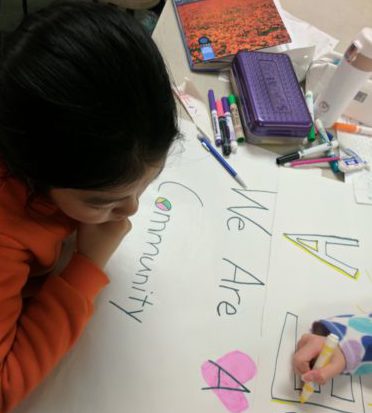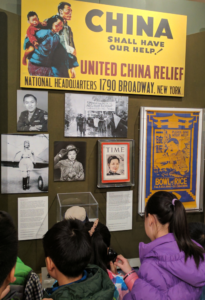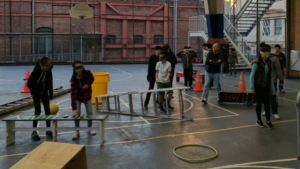
by Rene Kamm, Youth Engagement Coordinator
On the first Monday following the new administration’s “Muslim ban” – Trump’s executive order banning immigrants from seven predominantly Muslim countries – each BAP class joined me in Cameron House’s main yard for an activity.
“Immigrating to a new country can be dangerous,” I began, as we looked out onto the yard, which had ladders, cones, and various other obstacles scattered about. “Today, we are going to travel from one side of the yard, which represents our home country, to the other side of the yard, which represents America. Of course, we’re going to need to pick up a passport on the way,” I pointed to a box that had slips of paper with different countries written on each one.
The students traversed the obstacle course, collecting their passports along the way. Eventually, they met me on the other side of the yard. “Welcome to America!” I said gleefully, “You must have had a long journey. Can I see your passport?” As each student revealed their passports, some reading “Syria” or “Iran” or “Yemen,” I broke the news, “I’m sorry, but your home country isn’t allowed into America. You’ll need to start over.”
“That’s not fair!” some students shouted. Others trudged back to the start with a dejected look on their faces. More hopeful students asked, “Well, what countries are allowed in?” As they tried and tried again, some students were lucky enough to draw a French passport or a Greek passport. One student even shared the same Canadian passport so that all of his friends could complete the obstacle course. Another student gave up after his third try. “I don’t want to play anymore,” he said.
After the activity, students empathized with the citizens and refugees of those banned countries. “My heart feels broken,” said Allison, a fourth grader. “Let’s ask Trump how he would feel if he was banned,” asserted fifth grader Joanna. “It isn’t fair because you can’t choose what country you’re from,” said Raymond, an eighth grader. When asked if any of them knew someone who had immigrated to America, every student raised their hand.
Together, we watched a video of an Iranian-American man whose brother was sent back to Iran because of the ban, asking how this could happen with tears in his eyes. The video reduced the fourth and fifth grade class to tears. “What can we do?” one student asked.
Two days later, under the guidance of their teacher (and Youth Development Leader) Andrea Ye, that same class made posters to hang around Cameron House. The posters aimed to show that we as a community stood in solidarity with those who were being treated unfairly and unjustly. That we welcomed people of all creeds, races, and faiths.
“It really surprised me how much empathy they displayed at such a young age,” said Andrea. “Especially for an issue that’s so much bigger than what they’re used to dealing with. My students impressed me and showed a side of themselves that I usually don’t see: a compassionate side to their emotions. It makes me hopeful for our future.”

As an agency that continues to serve the Chinese immigrant population of San Francisco, Cameron House is proud to be partnering with the Center for Asian American Media (CAAM) to co-present “The Chinese Exclusion Act,” a documentary by Ric Burns and Li-Shin Yu. We are honored to co-present such an important and compelling film, as Cameron House’s own mission and story are woven into the legacy of the Chinese Exclusion Act.
The Chinese Exclusion Act will show on Sunday, March 19 at 7pm at the Castro Theatre, and will be the final film of this year’s CAAMFest, which runs from March 9-19. For more information and to buy tickets, please visit their website.
